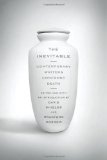Summary | Excerpt | Reviews | Beyond the Book | Readalikes | Genres & Themes | Author Bio

Contemporary Writers Confront Death
by David Shields, Bradford MorrowCONTENTS
INTRODUCTION
Birth is not inevitable. Life certainly isn’t. The sole inevitability of existence, the only absolute consequence of being alive, is death. As Jamaica Kincaid succinctly put it, “Inevitable to life is death and not inevitable to death is life.” Or, in J. M. Coetzee’s words, “That, finally, is all it means to be alive: to be able to die.” Whereas once one could frame mortality within the faithful ideology of an afterlife, now many can no longer speak with assurance about the immortality of the soul, the timelessness of art, the consolation of philosophy, or the everlasting reach of heaven. Where does this leave us? How do we face death? What is death and how does it touch upon -life?
In posing these questions to twenty contemporary writers, we understood we were asking them to speak about the unspeakable, envision the unseeable. From their brave and eloquent responses, grieving and dancing in the face of the abyss, grew the organizing principle of the book: here is an early- twenty-first-century attempt to look at death from distinctly different points of view, by writers who see death as a brute biological fact that does not necessarily guarantee some passageway to eternal peace or punishment. And while this gathering may center on death, it is ultimately about the existential fact of our ineffable selves, our mortal bodies, death’s fragile “other half”: life -itself.
Family naturally serves as a touchstone in many of these essays. David Gates’s “Deathwatch” is ostensibly an evocation of the deaths of his mother, his stepmother, and especially his father, but it is at least as much a searing self-portrait of a dead man walking: “I can’t make sense of this story, but I see now that it’s been the only one I’ve ever told.” In a similar way, Robert Clark makes both a literal and a figurative search for his dead sister, Charles Dickens’s childhood home, and the religious ecstasy of Thomas Aquinas even as he searches for the past, the sources of his art, and the ground of his faith that consists of searching, yearning, and missing: “I would like . . . God to make me present to Himself, and to her [his sister], and to everything I thought was lost or missing.” After her husband’s unexpected death, Joyce Carol Oates is forced to work through the acutely painful process of suddenly being a widow, alone in a house filled with the memories and artifacts of a decades-long marriage. In “The Siege,” she confronts the loneliness and guilt of the survivor, while learning how to get through days and nights irrevocably altered by -death.
Reprinted from The Inevitable, Contemporary Writers Confront Death edited by David Shields and Bradford Morrow (c) 2011 by David Shields and Bradford Morrow. Used with permission of the publisher, W. W. Norton & Company, Inc.
Your guide toexceptional books
BookBrowse seeks out and recommends the best in contemporary fiction and nonfiction—books that not only engage and entertain but also deepen our understanding of ourselves and the world around us.